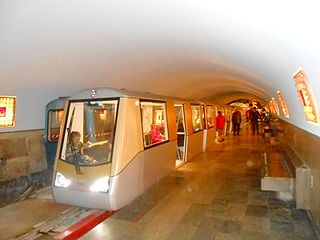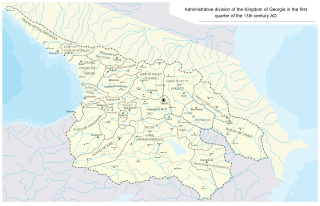
Bzyb Mountain Range is a mountain range in Abkhazia, Georgia on the southern slope of the western part of Greater Caucasus. The ridge is about 50 km long.

New Athos or Akhali Atoni is a town in the Gudauta raion of Abkhazia situated some 22 km (14 mi) from Sukhumi by the shores of the Black Sea. The town was previously known under the names Nikopol, Acheisos, Anakopia, Nikopia, Nikofia, Nikopsis, Absara, and Psyrtskha.

The New Athos Cave also Novoafonskaya, Novy Afon Cave, or New Afon Cave is a karst cave in the Iverian Mountain in Abkhazia (Georgia) near the city of New Athos.

Abkhazia is a region in South Caucasus. It is a de facto independent republic, but internationally is mostly recognized as part of Georgia.

New Athos Cave Railway, also known as New Athos Subway, is an underground electric railroad serving the New Athos Cave, in the town of New Athos, Abkhazia.
Football is a major sport in Abkhazia. During Soviet times, the main club within Abkhazia itself was FC Dinamo Sukhumi, but Abkhazian footballers were prominent in the Georgian team FC Dinamo Tbilisi and in other Soviet teams. In 1994, after its declaration of independence from Georgia, Abkhazia organised a nine-team amateur league.

Abkhazia is a cultural region in the South Caucasus. It has a long history of wine-making. Most of the produced wine is consumed locally or exported to Russia.

During the Soviet-era, the Abkhaz ASSR was divided into six raions (districts) named after their respective capitals.

The economy of Abkhazia is heavily integrated with the economy of Russia and uses the Russian ruble as its currency.
Abrskil Cave or Abrskila is a stalactite cave near Otapi village in Abkhazia, Georgia. It is named after the national hero of Abrskil — a parallel folk hero of the Greek Prometheus and Georgian Amiran — known as Abkhaz Prometheus. It is also called the Otap cave. Abrskila is more than 2 km in length out of which about 1.5 to 1.7 km is accessible for viewing. Its beauty and fame is compared favourably with another cave known as the New Athos Cave.
Tourism in Abkhazia has been an important part of its economy. Visiting Abkhazia for non-Georgian citizens is technically illegal under the Georgian law, by which the Georgian government prohibits most foreigners from entering the disputed territory except from the Georgian side, which in turn is not usually allowed by the Abkhaz authorities. Abkhazia continues to be accessible for tourists coming from the Russian side of the Abkhazia–Russia border which is not under Georgian control. Low prices and an absence of any visa requirements attracts Russian tourists, especially those who can not afford the vacations in Turkey, Egypt, Bulgaria and other popular Russian touristic directions.

Anakopia Fortress is an ancient military citadel in New Athos in the disputed Abkhazia located some 22 km by road along the coast from Sokhumi. The site, approximately 450 × 150 meters in dimensions, is located a mile or so inland, at the top of the Iverian Mountain. It is the most complete surviving building of ancient Anakopia, the former capital of the Kingdom of Abkhazia.

New Athos Monastery is a monastery in New Athos, municipality of Gudauta, in a breakaway republic of Abkhazia.

The Duchy of Tskhumi was a duchy (saeristavo) in a medieval Georgia. Ruled by a House of Shervashidze, the duchy existed from 8th to 14th century, in the north-western part of Georgia and comprised territories around modern Sukhumi, Georgia.
The Otkhara cave complex is a group of caves at the foot of the Bzyb Range in Abkhazia, an entity in the South Caucasus with a disputed political status. It is located on a steep rock near the village of Otkhara, some 20 km northwest of the town of Gudauta. The caves are also known as those of Mchishta after a karst river effluxing from the base of the rock. The openings are at least partially artificial. Local legends and a scholarly hypothesis suggest religious use in the Middle Ages, but the exact function and timing remains unknown.
The Msygkhua church is a ruined medieval church at the village of Tskuara (Phsygkhva) in Abkhazia, an entity in the South Caucasus with a disputed political status. It is located on the eponymous hill in the Tskuara river valley, immediately west of the town of New Athos, at the Black Sea coastline.

Karoulia is an Eastern Orthodox skete of the community of Mount Athos that is subordinate to the Great Lavra. It is located on the southernmost shore of Mount Athos.
Saint Nilus the Myrrh-streamer, also known as Nilos/Nilus the Myrrh-gusher, Nilus of Kynouria, or Nilus the Myroblyte, was an Orthodox Christian ascetic who lived at Mount Athos. He was a monk at the Monastery of Great Lavra who spent much of his life as a hermit at the southern tip of the Athos Peninsula.
Saint Acacius or Akakios the Younger, also known as Akakios the New of Kafsokalyvia was a Greek Orthodox Christian monk and ascetic who lived on Mount Athos. His feast day is celebrated by the Eastern Orthodox Church on April 12.
The Hermitage of Agios Vasileios, also sometimes referred to as the Skete of St. Basil, is an Orthodox skete on Mount Athos.
















